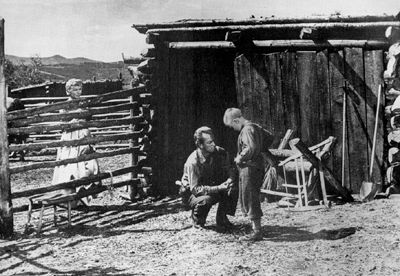|
30 Great Westerns
Shane (1953) is a film that is in many ways greater than the sum of its parts, an American touchstone that reverberates as much as little Joey’s call: "Shane--come back, Shane!" As an example of its continued cultural relevance, in the 1998 action thriller The Negotiator, Samuel L. Jackson’s character names Shane as his favorite Western--a choice the Kevin Spacey character challenges because the hero dies at the end. The debate over whether Shane dies (which is ambiguous) becomes a key question in The Negotiator--why do we value tales that ask martyrdom (or at best exile) of its heroes?
As a director, George Stevens was best known in the ‘30s and ‘40s for sophisticated comedies and dramas, several with Jean Arthur, who came out of semi-retirement to play Marian Starrett in Shane. The capstone of Stephen’s varied career came three years later with Giant--like Shane, a film exploring a triangular relationship set in the West.
Shane arrives without explanation at the Starrett farm, where he signs on as hired hand (and protector). Van Heflin plays Joe Starrett, a farmer committed to his family, his farm, and to rallying his neighbors to stand up against the cattleman Ryker. Joe and Shane quickly bond, recognizing the values that they share--courage, conviction, loyalty, and tenderness--but their different pasts dictate the divergent roles that they must play in facing Ryker and his henchmen. Each man envies the other’s position, considering the possibility of trading places, but to best serve the Starrett family and the community at large, they must remain true to their own path.
It is the quiet, charisma of Alan Ladd as Shane that sets the film apart in the imagination. In A Biographical Dictionary of Film (1975), David Thomson wrote: "Once Ladd had acquired an unsmiling hardness, he was transformed from an extra to a phenomenon. Ladd's calm slender ferocity make it clear that he was the first American actor to show the killer as a cold angel." Shane is the story of a gunfighter who tries to leave violence and his past behind, to be the angel and not the killer. But Shane is faced with the paradox that a just society must have violent saviors as much as it must banish them from its comforts and joys. Shane’s final victory and banishment are more tragic than any failure or death could be.
Thomson’s description brings to mind a host of actors who have followed in Ladd’s silent footsteps, in particular Clint Eastwood. Not only is his persona a more hardened version of Ladd’s, but his work as a director has been highly influenced by Shane. In High Plains Drifter, another film where normal citizens are dependent on the services of an extraordinary gunfighter, the arrival and departure of the Drifter, the opening and closing of the film, mirrors Shane. Pale Rider is an uncredited adaptation of Shane, transposing the conflict from big rancher/small ranchers to big miner/small miners, but maintaining the plot structure, including such details as the joint removal of an obstacle (the stump becomes a large rock) and the final cry by a youth after the departing gunfighter.
This film marks early appearances by Ben Johnson and Jack Palance as Ryker’s hired men, Chris Calloway and Jack Wilson. Like Shane, Chris develops a conscience, becomes aware of the consequences of his misplaced loyalties, and comes to respect and help Shane. Wilson as played by Palance is the epitome of the glittering, stone-cold killer, who takes pleasure in this cruelty.
The performance of Brandon DeWilde as Joey Starrett is the glue of the film, the eyes that watch Shane from the beginning to the end and through whose eyes all events play out. Stevens’ shooting of the fight between Chris and Shane from the point-of-view of the hiding Joey is considered a classic. Joey’s innocent love of Shane is infectious, so that his longing cry for Shane at the movie's conclusion becomes the audience’s longing for a pure man, a once-and-future hero who may reappear when we need him most.
--by Elizabeth Abele
|
